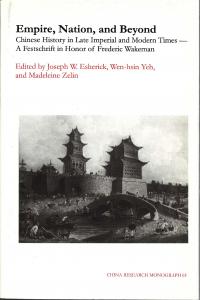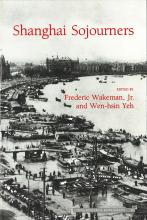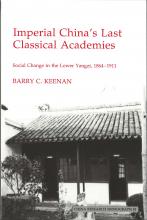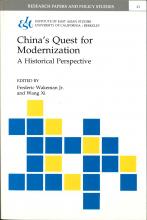Empire, Nation, and Beyond
Empire, Nation, and Beyond
Joseph W. Esherick, ed., Madeleine Zelin, ed., Wen-hsin Yeh, ed.
The essays in this collection, all by Frederic Wakeman's former students, approach the past with sensitivities to the dynamics of politics, the power of cultural or ideological norms, the complexities of local infrastructures and the significance of human choices. Reflecting the wide chronological range, thematic diversity, and methodological versatility of Wakeman's scholarship and mentoring, the essays traverse the broad terrain of late imperial and modern Chinese history.
As a nonprofit academic press, we need your support to publish our books. Your gift can help us make more of our titles available as e-books. DONATE NOW
Title information
The essays in this collection, all by Frederic Wakeman's former students, approach the past with sensitivities to the dynamics of politics, the power of cultural or ideological norms, the complexities of local infrastructures and the significance of human choices. Part 1 sheds light on the inner workings of late imperial society. Part 2 addresses local patterns of profit-making and the role of the state. Part 3 looks at China's response to the West. Part 4 is about social history and the networks of patronage, community service, and family that characterized Chinese society. Part 5 examines the contested narratives of China's twentieth-century history.
Contributors:
Sue Fawn Chung is associate professor of history at the University of Nevada, where she has served as director of international programs and chair of the department.
Mark C. Elliot is Mark Schwartz Professor of Chinese and Inner Asian History at Harvard University.
Robert Y. Eng is professor of history and department chair at the University of Redlands.
Joseph W. Esherick is professor of history and Hsiu Professor of Chinese Studies at the University of California, San Diego.
Linda Grove is professor, Faculty of Liberal Arts, Sophia University.
Lionel M. Jensen is associate professor and chair of the Department of East Asian Languages and Literatures at the University of Notre Dame.
Melissa Macauley is associate professor of history and Charles Deering McCormick Professor of Teaching Excellence at Northwestern University.
Jonathan Porter is professor of history at the University of New Mexico.
Richard Shek is professor of humanities and religious studies at California State University, Sacramento.
Ann Waltner is professor of history and director of the Institute for Advanced Study at the University of Minnesota.
Jeffrey Wasserstrom is professor of history at the University of California, Irvine.
Timothy Weston is associate professor of history at the University of Colorado.
Wen-hsin Yeh is Richard H. and Laurie C. Morrison Professor in History at the University of California, Berkeley.
Madeleine Zelin is professor of modern Chinese history and director of the East Asian National Resource Center at Columbia University.
Joseph W. Esherick, ed.
Joseph W. Esherick is emeritus professor of modern Chinese history at the University of California, San Diego.
B.A. Harvard University, Ph.D. University of California, Berkeley
Madeleine Zelin, ed.
Madeleine Zelin is Dean Lung Professor of Chinese Studies and professor of history at Columbia University.
B.A. Cornell University, Ph.D. University of California, Berkeley
Wen-hsin Yeh, ed.
Wen-hsin Yeh is professor of history at the University of California, Berkeley. She has served as the director of the Institute of East Asian Studies and the chair of the Center for Chinese Studies at Berkeley. She has edited and contributed to many IEAS publications, including Mobile Subjects; Mobile Horizons; History in Images; Cities in Motion; Empire, Nation, and Beyond; Cross-Cultural Readings of Chineseness; Landscape, Culture, and Space in Chinese Society; and Shanghai Sojourners.
B.A., History, National Taiwan University; M.A., History, University of Southern California; Ph.D., History, University of California, Berkeley
Empire, Nation, and Beyond
Contributors – vii
Introduction – 1
- Part I: Unofficial Accounts – 15
1. Manchus as Ethnographic Subject in the Qing – 17
Mark C. Elliott - 2. Fictional and Real-Life Rulers: Journey to the West and Sixteenth-Century Chinese Monarchs – 38
Richard Shek - 3. The Disputation of the Body Snatchers: Scandal in Chinese Legal Culture – 58
Melissa Macauley - 4. Spatial Decorum, Transgression, and Displacement in Shen Fu's Six Records from a Floating Life – 78
Ann Waltner - Part II: Politics in Economy – 103
- 5. Eastern Sichuan Coal Mines in the Late Qing – 105
Madeleine Zelin - 6. Rural Commercialization, Polder Reclamation, and Social Transformation in Modern China – 123
Robert Y. Eng - 7. "Native" and "Foreign": Discourses on Economic Nationalism and Market Practice in Twentieth-Century North China – 149
Linda Grove - Part III: Beyond the Binary – 167
- 8. Shards of Ming: Culture and Improvisation in Enterprises Great and Small – 169
Lionel M. Jenson - 9. Terror and War at the Turn of Two Centuries: The Boxer Crisis Revisited – 192
Jeffrey N. Wasserstrom - Part IV: Enduring Networks – 211
- 10. The Culture of Patronage in Early Nineteenth-Century China: Ruan Yuan's Circle at Canton – 213
Jonathan Porter - 11. The Zhigongtang in the United States, 1860–1949 – 231
Sue Fawn Chung - 12. Two Generations of a Chinese Family – 250
Joseph W. Esherick - Part V: Contesting Narratives – 273
- 13. Beijing University as a Contested Symbol – 275
Timothy B. Weston - 14. History in Modernity: The May Fourth Movement and Shanghai – 292
Wen-hsin Yeh - Index – 309
|
JOURNAL REVIEWS |
|
"The ten original and four republished contributions of this festschrift reveal much about Wakeman's influence on the contributors who–according to the editors–"cohere in their endeavour to look beyond the obvious ... to consider the weight of documented evidence and to make a case through a methodical teasing out of the inherent logic" (p. 13) of their historical sources. And indeed the volume coheres with its ideas about how to write history. That is why the reader comes to appreciate this book...by what it tells us about the discipline of modern Chinese history." ~Susanne Weigelin-Schwiedrzik, in The China Quarterly (http://www.jstor.org/stable/20192185) |
|
"This collection of essays, by fourteen distinguished students of Fred Wakeman, appeared only shortly before his untimely death, which itself came very soon after his retirement. One imagines he must have felt both honoured and gratified at the superior level and broad range of scholarship on display, qualities that aptly reflect and refract his own scholarly endeavours....The usual misgivings about the uneven quality of festschrifts and of essay collections more generally are completely misplaced here. The essays are individually and collectively strong....[T]he single thread that binds them together is perhaps the heritage of Wakeman's eclectic and acute spirit of enquiry....This book adds up to much more than the sum of its parts. It is an apt monument to Professor Wakeman, and its essays will be read and cited for some years to come. Its wide coverage and innovative scholarship should attract attention well beyond the field of Chinese History." ~Joanna Waley-Cohen, New York University, in China Review (http://www.jstor.org/stable/23462270) |




